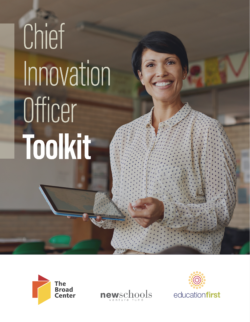The COVID-19 pandemic has inflicted unprecedented challenges on K12 and postsecondary education systems. It has laid bare and exacerbated the structural and racialized inequities that exist in our society’s institutions—from education to healthcare, housing, food security and employment. The education, health and economic impacts are having a compounding effect on Black, Brown and Indigenous communities, as well as on English learners and students with learning differences—and the intersectionality of these learning needs. With the combination of new COVID variants emerging and accumulated unfinished learning, there is even more impetus to shift away from a “return to pre-COVID” and reimagine what the future could look like for school systems and the students and families they serve.
The challenge is that the pace, intensity and scale of change required for communities to better serve students of color, students experiencing poverty, English learners and students with learning differences is far greater than many districts’ capacity to deliver. This is the moment for district innovation—for districts to reflect on what they have learned and innovate further to reimagine schooling for an equitable future.
Click on the following tabs to learn more about our work to support district innovation:
Below are resources we have published that speak to the research we have conducted on designing school systems with equity at the center and the role of the Chief Innovation Officer (CIO).




Throughout school districts’ responses to the pandemic, district leaders have continually come up against the rigidity of their one-size-fits-most systems and lack of forward-facing planning. The pace, intensity and scale of change required for districts to better serve all students, and especially students of color and/or students experiencing poverty, is far greater than most districts’ current capacity to deliver in this context. While there is a great emphasis on quick technical support and impromptu communities of practice to help districts make smart investments today, there is a need that precedes the pandemic to help districts create and embed an equity driven theory of change.
Committing to and creating space for innovation for equity requires a leader, like a Chief Innovation Officer (CIO), with the agility and a laser-like focus on addressing the challenges of systems-change work AND requires new, more equitable ways of thinking and working. The CIO has the critical role of creating the right conditions to embed innovation for equity in their district, helping the district navigate today’s current challenges while keeping an eye on the future.
In 2021, made possible with the support of NewSchools Venture Fund, Education First sought to build off the Chief Innovation Officer (CIO) Toolkit and interviewed and surveyed district innovation leaders, national policy experts and parent advocates to test the idea of a national network designed specifically to increase the number of district leaders equipped and supported to strategically plan and implement systemic change in the name of increased equity. The result is the creation of a new network filling a current gap in the leadership development and cohort space—The Imagine Network. The Imagine Network is designed to support district Chief Innovation Officers, or those in similar roles, to equip them with the tools, knowledge, skills and professional network to lead with equity, and design and implement sustainable and innovative changes aligned to student and family needs.
It is an annually selected cohort of district innovation leaders that will operationalize the CIO Toolkit findings with equity as a through-line and create a coalition of the willing to lead district reform from within school systems. The Imagine Network will:
When Education First interviewed CIOs in the fall of 2021, data showed that they are eager to join the Imagine Network as a catalyst and accelerant for creating agile practices and innovative options.

The CIO role, when properly focused and supported, serves as a critical internal change agent and creates a diverse leadership pipeline.

The network will occur on a one-year cycle where each cohort will have up to 15 participants. The network will feature three required in-person convenings and there will be optional quarterly learning sessions where participants can learn from a variety of experts in a virtual setting. Furthermore, CIOs will receive monthly one-on-one coaching on innovation work and equitable design as part of their participation in the network.
The first cohort of The Imagine Network will launch in the late spring of 2022 and we will release applications soon. In the meantime, you can reach out to Margo Roen to learn more or express interest in the first cohort of the network.
We are looking for participants who:

Recognizing the critical role that Chief Innovation Officers (CIOs) play in leading how districts navigate today’s current challenges while keeping an eye on the future, we created the CIO Toolkit in partnership with NewSchools Venture Fund and The Broad Center in 2020. This research-backed toolkit is designed to help districts, and CIOs, make strategic decisions about their needs. Through research with school, policy and national leaders, we’ve identified four core work streams, five essential competencies and four key mindsets of a successful CIO. The Imagine Network will build upon the findings of the CIO Toolkit to provide targeted supports to participants that address the core workstreams, competencies and mindsets.
This toolkit was developed using desk research; interviews with current and former district, policy, philanthropic and nonprofit leaders; and the experiences of the authors and collaborators. This process yielded four core workstreams, five essential competencies and four key mindsets of a successful CIO. The toolkit also contains resources to help districts create, hire, rehire and reflect on the role and its potential for impact.

Now, amid radically shifting learning environments caused by the COVID-19 pandemic, CIOs’ knowledge, skills, and mindsets are critical for shepherding school districts through this time of enormous change and uncertainty. As one superintendent shared, “Maybe ten years ago it was optional to have a CIO role; now it is critical and necessary.
